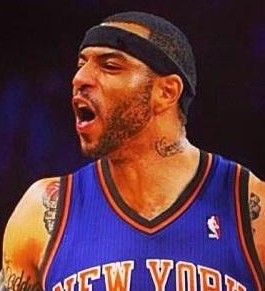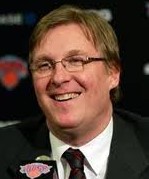 NEW YORK — Five general managers, eight coaches, 19 years, and amazingly, 225 different players.
NEW YORK — Five general managers, eight coaches, 19 years, and amazingly, 225 different players.
The cast of characters that have come and gone since the Knicks last won a division title in 1994 is as expansive as the shadow that Madison Square Garden casts between 31st and 33rd Streets in Midtown Manhattan.
Now, here, in 2013, the team is poised to end the 19-year drought. And whether or not the Knicks do that this season, the fact that they have that opportunity with less than 12 games remaining is a feat, in and of itself.
And it’s a feat that could not have been performed without the gutsy moves made by Glen Grunwald.
He has been muzzled by the organization, rarely conducting interviews. Not surprisingly, he is seldom credited for helping the Knicks change the immediate fortunes of their franchise.
That has to end, so allow yours truly.
Grunwald succeeded Donnie Walsh on July 1, 2011 and wore the interim tag for about 10 months. During that time, he made bold, gutsy calls that have mostly worked out. That is why the Knicks are where they are today.
The team that Grunwald inherited had a gaping hole in the middle, woefully inconsistent perimeter shooting and a laughable lack of depth.
Amazingly, in just 20 months, the entire roster has been turned over around Amar’e Stoudemire and Carmelo Anthony.
Grunwald’s very first move was hiring Mike Woodson to be Mike D’Anotni’s lead assistant. And it is difficult to argue with the results. The demise of D’Antoni was pre-ordained from the moment Walsh resigned. But since taking over, despite his faults, Woodson is 62-32 as head coach. That’s success.
Once the 2011 NBA Lockout ended, as an interim, Grunwald’s first personnel move was to amnesty Chauncey Billups and use the acquired cap space to sign Tyson Chandler. When it happened, it was a move that wreaked of impatience — and I said that back then.
Now, years later, as the doubts about Stoudemire’s long-term ability to stay healthy have unfortunately come to fruition, the concern of using the one-time amnesty on Billups—as opposed to saving it for Stoudemire—has been validated.
Since Chandler has become a Knick, he has proven himself to be a culture changer. When I spoke with him one-on-one in November and December, it became apparent to me that Chandler was all about winning, not himself.
(RELATED: IN A BREAK FROM LINSANITY, A TYSON CHANDLER COLUMN)
Had the Knicks kept Billups, they would have had about $13 million in cap space in July 2012 and the ability to amnesty Stoudemire. But now, we know, Chandler was, and is, worth blowing that up.
His Defensive Player of the Year Award, Olympic Gold Medal and first NBA All-Star appearance have validated Grunwald’s rolling of the dice.
Again, success.
 Armed with a New York skyline featuring Chandler, Anthony and Stoudemire, Grunwald needed to get creative and resourceful and fill out a roster around the triumvirate.
Armed with a New York skyline featuring Chandler, Anthony and Stoudemire, Grunwald needed to get creative and resourceful and fill out a roster around the triumvirate.
Baron Davis and Mike Bibby did not quite work out for the Knicks, but Steve Novak and Jeremy Lin—both of whom Grunwald pulled out of thin air back in December 2011—did, in a major, major way.
Now, as we look back at the $2.5 million “room exception” that Grunwald had at his disposal at the beginning of the 2011-12 season, it is easy to forget the players that were angling to join the Knicks.
Instead of acting impatiently as he did with his pursuit of Chandler, Grunwald waited for J.R. Smith to return from China. A successful first season as a member of the Knicks and a friendly cap exception rule later, Smith is a part of the nucleus of this Knicks team and just so happens to be playing the best basketball of his career. Hopefully, his back-to-back 30-point games from off the bench will give him the renewed consideration for the NBA’s Sixth Man of the Year, an award I say he deserves.
And for those who say lightning does not strike the same place twice, Grunwald did the same exact thing with Kenyon Martin—who has been a godsend for this Knicks team.